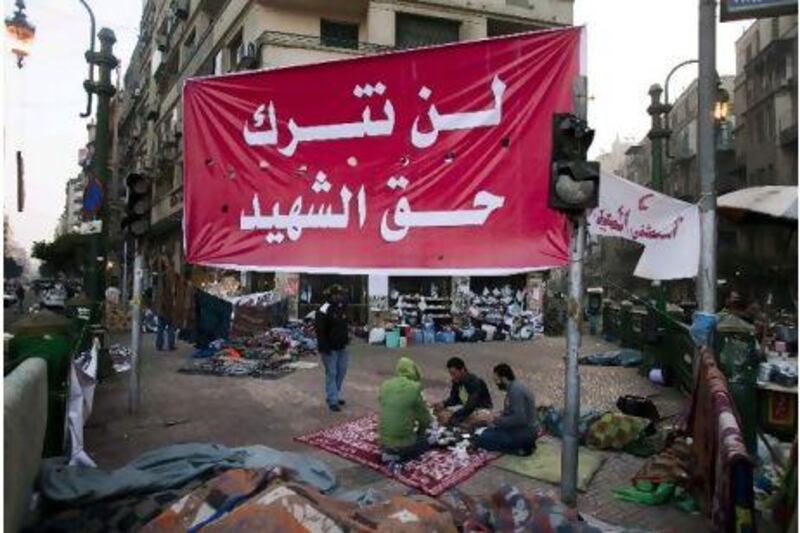CAIRO // Beneath the surface of Egypt's turbulent political climate just a day before elections are to begin is a vast economic uncertainty and a rising unemployment rate.
Thousands of protesters in Tahrir Square and elsewhere in the country have demanded the military cedes power to a civilian government, but polls show the real issue, aside from security, for the average Egyptians is the economy.
"If there is no real movement to realise social justice, then we will also face the 'Revolution of the Hungry'," said Ahmed Borai, Egypt's minister of manpower, in a recent interview. "Unemployment has been one of the biggest problems in the country."
In the year's third quarter, the unemployment rate rose to 11.9 per cent, up from 8.9 per cent in the same quarter of 2010, according to Egypt's Central Agency for Public Mobilization and Statistics. Even that number, which represents 3.17 million people looking for a job, probably masks the true rate, because more than half of the country's economy is driven by part-time labourers that cannot be tracked through traditional data collection.
The Supreme Council of the Armed Forces (Scaf), the 20-member body that heads the military and took charge of the country after Hosni Mubarak stepped down as president on February 11, has sought to position itself as the defender of the interests of the "silent majority" of the country who have suffered under the deteriorating economic climate.
With at least 42 people killed in fighting between central security forces and protesters since November 19, including a young man run over by a police van yesterday morning, police brutality and the military's poor stewardship of the country were also much on the public's mind.
The interior ministry expressed regret for the death, saying it was an accident.
Polls released before the latest uprising in the square appeared to confirm the belief that the vast majority of Egyptians care most about security and the economy at this point in the country's transition.
Half of the 2,400 respondents in a survey in September by the Al Ahram Centre for Political and Strategic Studies identified economic issues, including the reduction of daily living expenses, unemployment, corruption, raising incomes, and economic growth, as their top concerns for the parliamentary elections.
Speaking at a news conference on November 24, Major General Mukhtar El Malla pleaded with protesters to cease the occupation of Tahrir Square in the midst of elections, because it blocked traffic and hindered the country's democratic transition. A rival protest to the demonstrators in the square on Friday cited economic malaise as one of the reasons to allow elections to continue as planned under the leadership of the military. While activists have claimed that the Muslim Brotherhood's political arm, the Freedom and Justice Party, would suffer losses in the elections that begin tomorrow and continue Tuesday because of their lack of support for the Tahrir protests, some analysts believe they could gain from the turmoil because they have positioned themselves as a stable alternative to the increasingly chaotic situation in the country.
Despite the paucity of policy debate among the parties, the Muslim Brotherhood has a long history of supporting poor people through healthcare clinics and financial aid. In the choice between the secularist and Islamist parties that will be presented to Egyptians, the latter may come across as the only ones with a possible solution to economic woes.
Egypt's economic problems are rooted in its growing population, the largest in the Arab World. Unemployment in Egypt is a constantly rising problem as hundreds of thousands of people enter the job market annually.
Mr Borai said the Egyptian government from the 1960s to 2000 tried to tackle the problem by doling out public-sector jobs with low salaries to as many graduates as possible, even if they were not needed. But Mr Mubarak's regime ended that policy and was struggling to deal with the need for about 800,000 new jobs a year.
"The question is now what do we do," Mr Borai said. "New investments stopped after the revolution. Factories closed down."
A 1-billion Egyptian pound (Dh631 million) training fund to help Egyptians gain new qualifications is in this year's budget. The government also sought to reopen some factories, but those initiatives have had limited impacts so far.
Hisham Fahmy, the executive director of the American Chamber of Commerce in Egypt, said many foreign businesses have been scared off investing in the country because of security issues. The situation only gets worse as long as the transition to power of an elected government hangs in the balance, he said.
"This is an extreme period of economic uncertainty," Mr Fahmy said. "A lot of people are suffering.
Yesterday the head of Scaf, Field Marshal Hussein Tantawi, met separately with Mohamed ElBaradei and Amr Mussa, who have been touted by protesters as possible leaders of a new government, the official Mena agency said.
* With additional reporting by the Associated Press






